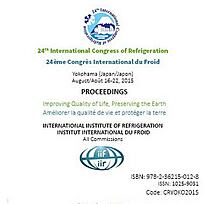
Document IIF
La cryo-MEB comme outil approprié pour étudier la vitrification des tissus cryoconservés.
Cryo-SEM as a suitable tool to study vitrification in cryopreserved tissue.
Numéro : pap. n. 614
Auteurs : SCHNEIDER TEIXEIRA A., MOLINA-GARCÍA A. D.
Résumé
Biological samples are successfully preserved for indefinite periods after vitrification, providing ice formation is avoided. Glass is difficult to characterize, especially at the extremely low temperatures required for biological tissues vitrification. Glass transition is traditionally observed by differential scanning calorimetry (DSC), in spite of its reduced sensitivity and lack of spatial information. In this work, a novel procedure, based on low-temperature scanning electron microscopy (cryo-SEM), is explored to locate vitrified areas and ice crystals in tissues and cells. Cryo-SEM observation of biological samples requires an etching phase to create contrast: a temperature rise, allowing ice partial sublimation. Glassy water, differently from crystallized water (ice), has a neglectable sublimation rate. Consequently, while the dark image of sublimated crystals and the resulting structural details can be observed in ice-containing samples, vitrified tissues show a smooth landscape, without dark areas or visible structure elements.
Documents disponibles
Format PDF
Pages : 8 p.
Disponible
Prix public
20 €
Prix membre*
Gratuit
* meilleur tarif applicable selon le type d'adhésion (voir le détail des avantages des adhésions individuelles et collectives)
Détails
- Titre original : Cryo-SEM as a suitable tool to study vitrification in cryopreserved tissue.
- Identifiant de la fiche : 30015704
- Langues : Anglais
- Source : Proceedings of the 24th IIR International Congress of Refrigeration: Yokohama, Japan, August 16-22, 2015.
- Date d'édition : 16/08/2015
- DOI : http://dx.doi.org/10.18462/iir.icr.2015.0614
Liens
Voir d'autres communications du même compte rendu (657)
Voir le compte rendu de la conférence
Indexation
- Thèmes : Influence du froid sur les cellules, tissus et organes
- Mots-clés : Vitrification; Tissu; Électron; Cryomicroscopie; Cryoconservation
-
Determination of the ice quantity by quantitati...
- Auteurs : LIU B. L., MCGRATH J.
- Date : 21/08/2007
- Langues : Anglais
- Source : ICR 2007. Refrigeration Creates the Future. Proceedings of the 22nd IIR International Congress of Refrigeration.
- Formats : PDF
Voir la fiche
-
Kryobank von Ovarialgewebe: Konzept und Perspek...
- Auteurs : ISACHENKO V., ISACHENKO E., WEISS J. M.
- Date : 19/11/2008
- Langues : Allemand
- Source : Deutsche Kälte-Klima-Tagung: 2008, Ulm.
Voir la fiche
-
Study on the segmentation of cryomicroscopic im...
- Auteurs : WANG W., ZHANG S. Z., CHEN G. M.
- Date : 22/04/2003
- Langues : Anglais
- Source : Cryogenics and refrigeration. Proceedings of ICCR 2003.
Voir la fiche
-
Cryomicroscope pour la cryoconservation de cell...
- Auteurs : GROSS T., SOMMERFELD S., ROLING C., HESCHEL I., SCHWINDKE P., RAU P.
- Date : 22/11/1995
- Langues : Allemand
- Source : DKV-Tagungsbericht 1995, Ulm.
Voir la fiche
-
From the tissue bank to the tissue establishment.
- Auteurs : MERICKA P., STRAKOVÁ H., HORYNOVÁ A.
- Date : 21/04/2008
- Langues : Anglais
- Source : Cryogenics 2008. Proceedings of the 10th IIR International Conference
- Formats : PDF
Voir la fiche
